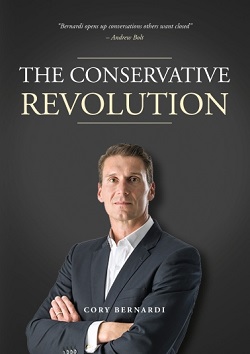 The Conservative Revolution by Cory Bernardi
The Conservative Revolution by Cory Bernardi
Connor Court Publishing, November 1st, 2013
While I knew the name, I didn’t really know all that much about Cory Bernardi until an old friend and new leftist brought him up on social media a few years ago. All I knew following an online search was that he’s a federal senator from South Australia, a Catholic and politically speaking; a fairly typical social conservative. As the modern conservative movement is mostly what was of the left twenty five years ago, he is also considered “outspoken”. This just means on some issues, particularly social, he offends leftists by politely explaining his reasons for disapproving of things like infanticide, homosexuality and the Australian Broadcasting Corporation. While certainly an ideological puppy dog to my eyes, he did win my respect by virtue of being hated by people I’m sure we mutually loath. And after noticing the book for a few dollars, I thought I may as well see what he had to say.
Around the same time I learned more about Cory Bernardi than his name, was also some months after the release of the book being reviewed here. What caught many people’s attention was not the content of the book but the furious and pitiful response to it. Shortly after or on release, leftist ghouls descended on the books Amazon page and left hundreds of reviews. I’ve not read more than a few, but the vast majority (positive and negative) seem to be from people who’ve not read the book. The small sample I managed to get through had the typical psychological projection, an essential characteristic of an SJW. He’s a hateful, hater of hate and all that.
If they’d actually read it (and I’d be surprised if there are many outside a Quadrant Magazine fundraising dinner who have), they’d have found it incredibly tame. The book itself is very short and depending where you count is anywhere from 162 to a little over 170 pages. This wouldn’t be a criticism but there is also an awful lot of repetition including “This is why we need a conservative revolution”, over and over again throughout the book. Bernardi begins by admitting the limitations of the scope of the book but it is limited by more than scope. There really is nothing new or even a thoughtful observation about something old to find in here. Unless you’re totally new to conservative thought, there is nothing you haven’t heard or read before. Edmund Burke, Adam Smith, G.K. Chesterton and Roger Scruton all get a mention. As surprisingly does Sam Francis but of course nothing interesting that he said. If I was ending the review here, the most positive thing I could say was that it would be a good civics book for anyone interested in what passes for conservatism now.
I don’t consider myself conservative and haven’t for quite a while now. That’s not to say I don’t agree with a lot of what it’s in here, just that it is so weakly stated that I found it difficult to concentrate. If this book is meant to inspire a revolution, then the prose will fall as flat as the calls to fight for flag, freedom, family and free markets. I rightly suspected when I started reading this book that Bernardi would avoid topics like race, culture and immigration and I was right. They do get a mention but he carefully treads by them with all the acceptable conservative beliefs about the importance of “assimilation” and “shared culture”. The kind of language that still gets you called a racist, just in a less direct way.
Bernardi and others seems not to understand how foreign all of the standard conservative beliefs are to most cultures. The conservatism Bernardi believes in is almost entirely confined to the Anglosphere, has few converts and an ever growing number of apostates. Bernardi, having an Italian background is one of the few converts. Like it or not, right or left, most Australians now see the government as their mummy. This must be hard for traditional conservatives, libertarians and the classical liberals to come to terms with – but it’s true. Stopping this seems very unlikely and the only way it could even be slowed down at this point is through immigration restriction. Reforming social welfare would be a war of attrition that few politicians are willing to fight. Even if they did, nations are nations because of the people. Like so many, Bernardi is unwilling to address this and this is why he will never get a conservative revolution.
I don’t have anything against him and of what I know, I quite like the guy. He’s also a lot more exposed to attack than I am and for that alone, deserves respect. He does advocate a more muscular response to leftists writing:
However speaking against things is not the recipe for success in seeking to restore the strength of the conservative pillars of our nation… It is time to stop being defensive in our attitude to politics… The values and ideas we stand for are not things to be ashamed of…
This is fine stuff but hard to take seriously when the man writing has avoided talking about the main reason the society he values has largely been lost. The conservative movement has failed to conserve anything and that’s why calls for a revolution will fall on deaf ears. Those on the right that are energised for revolution are on the alternative right and aren’t much interested in their old man’s conservatism.
